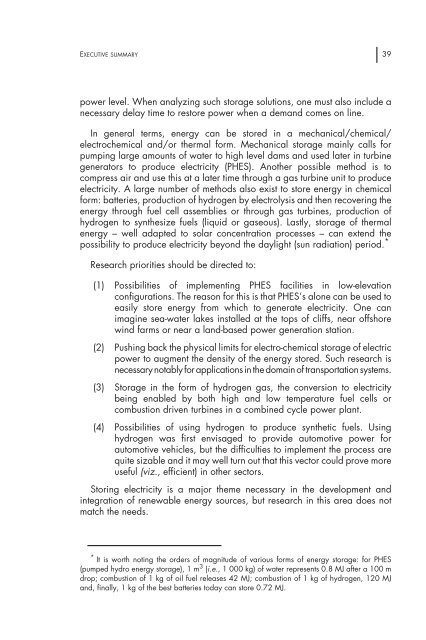La recherche scientifique face aux défis de l'énergie - BibSciences.org
La recherche scientifique face aux défis de l'énergie - BibSciences.org
La recherche scientifique face aux défis de l'énergie - BibSciences.org
You also want an ePaper? Increase the reach of your titles
YUMPU automatically turns print PDFs into web optimized ePapers that Google loves.
EXECUTIVE SUMMARY 39<br />
power level. When analyzing such storage solutions, one must also inclu<strong>de</strong> a<br />
necessary <strong>de</strong>lay time to restore power when a <strong>de</strong>mand comes on line.<br />
In general terms, energy can be stored in a mechanical/chemical/<br />
electrochemical and/or thermal form. Mechanical storage mainly calls for<br />
pumping large amounts of water to high level dams and used later in turbine<br />
generators to produce electricity (PHES). Another possible method is to<br />
compress air and use this at a later time through a gas turbine unit to produce<br />
electricity. A large number of methods also exist to store energy in chemical<br />
form: batteries, production of hydrogen by electrolysis and then recovering the<br />
energy through fuel cell assemblies or through gas turbines, production of<br />
hydrogen to synthesize fuels (liquid or gaseous). <strong>La</strong>stly, storage of thermal<br />
energy – well adapted to solar concentration processes – can extend the<br />
possibility to produce electricity beyond the daylight (sun radiation) period. *<br />
Research priorities should be directed to:<br />
(1) Possibilities of implementing PHES facilities in low-elevation<br />
configurations. The reason for this is that PHES’s alone can be used to<br />
easily store energy from which to generate electricity. One can<br />
imagine sea-water lakes installed at the tops of cliffs, near offshore<br />
wind farms or near a land-based power generation station.<br />
(2) Pushing back the physical limits for electro-chemical storage of electric<br />
power to augment the <strong>de</strong>nsity of the energy stored. Such research is<br />
necessary notably for applications in the domain of transportation systems.<br />
(3) Storage in the form of hydrogen gas, the conversion to electricity<br />
being enabled by both high and low temperature fuel cells or<br />
combustion driven turbines in a combined cycle power plant.<br />
(4) Possibilities of using hydrogen to produce synthetic fuels. Using<br />
hydrogen was first envisaged to provi<strong>de</strong> automotive power for<br />
automotive vehicles, but the difficulties to implement the process are<br />
quite sizable and it may well turn out that this vector could prove more<br />
useful (viz., efficient) in other sectors.<br />
Storing electricity is a major theme necessary in the <strong>de</strong>velopment and<br />
integration of renewable energy sources, but research in this area does not<br />
match the needs.<br />
* It is worth noting the or<strong>de</strong>rs of magnitu<strong>de</strong> of various forms of energy storage: for PHES<br />
(pumped hydro energy storage), 1 m 3 (i.e., 1 000 kg) of water represents 0.8 MJ after a 100 m<br />
drop; combustion of 1 kg of oil fuel releases 42 MJ; combustion of 1 kg of hydrogen, 120 MJ<br />
and, finally, 1 kg of the best batteries today can store 0.72 MJ.












